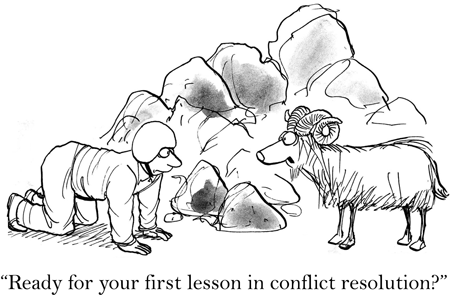Managing Conflicts
Managing Conflicts
How to recognise a conflict? How to best manage it? What role does your personality play? You will find some answers to these questions in this course.
This course is part of
Course description
In any social context, conflicts, as well as being inevitable, are also essential for grasping the potential of diversity and for growing as a person. Learning to deal with conflicts in a constructive way is essential. In reality, however, we give the word ‘conflict’ negative connotations and this is often what makes us react in a dysfunctional manner.
In private it is often easier to express dissent in a discussion or talk about our needs and hurt feelings.
But the more we feel more intimate with the other party (e.g... partner, family member or friend), the more we feel that he/she will be able to understand and forgive us for our emotional spills.
In the professional world, when we are in the midst of a conflict, we feel more restrained in expressing our needs or feelings openly, tending more to hide difficulties, until the conflict explodes in a completely unexpected way for the counter-party. Having complete emotional control is often seen as an ideal professional approach; 'emotional control', however, should not imply a denial of the emotional world.
Conflicts in the private and the professional worlds have the same general characteristics. What changes is our way of dealing with them, depending on the context, situations and interlocutors.
Total workload of the course: 25 hours

Intended Learning Outcomes
By actively participating in this MOOC, you will achieve different intended learning outcomes (ILOs).
- Better recognize the nature and dynamics of conflicts and their main types
ESCO: conflict management ESCO: resolve conflicts - Recognize the early signs of an emerging conflict and identify its level of escalation
ESCO: develop strategy to solve problems - Identify the origins of emotions and the key elements to develop emotional competence
ESCO: cope with pressure ESCO: cope with uncertainty - Identify the useful parameters to choose the most effective strategy for conflict management
Prerequisites
There are no prerequisites to take this course, but all of your personal experiences related to conflicts management will be a useful starting point.
Activities
The forum is freely accessible and participation is not guided; you can use it to compare yourself with other students, or to discuss course contents with them. It will not be moderated by the instructor.
Section outline
-
-
Week 1 provides a comprehensive introduction to understanding and navigating conflicts. You will explore the nature and dynamics of conflicts, gaining the tools to differentiate between problems and actual conflicts. The week examines the main types of conflict and highlights how to recognize early warning signs of emerging disputes. You will also be guided in identifying various levels of conflict escalation and will have opportunities to reflect on your own perceptions regarding the potential advantages and disadvantages of conflict. Through this process, you will build a deeper awareness of conflict as a complex but potentially constructive aspect of human interaction.
-
In Week 2, you will explore the psychological foundations of human behavior and emotion, particularly in the context of conflict. You will learn to recognize the key levers that drive human behavior and gain insight into the origins of emotions. The week will also focus on understanding emotional triggers—the underlying causes of impulsive emotional reactions—and how they influence responses in challenging situations. You will develop strategies to better manage anger, both your own and that of others, and identify the essential building blocks for developing emotional competence. This knowledge will support you in responding to conflicts with greater awareness and self-regulation.
-
In Week 3, you will delve into the role of personality and perception in conflict. You will learn to acknowledge how differences in personality can become sources of potential tension and identify which of the four basic needs is most dominant in shaping your own personality. This week also focuses on expanding your awareness of how limited and subjective your perception of reality can be. You will examine how your personal perceptions and underlying paradigms may create mental traps that hinder effective conflict resolution. Additionally, you will learn to recognize repetitive and dysfunctional behavior patterns that often emerge during conflicts, helping you respond more constructively in future situations.
-
In Week 4, you will focus on developing practical skills for resolving conflicts effectively. You will identify your predominant conflict resolution style and explore the main strategies available for managing conflict. You’ll also learn how to evaluate which strategy is most appropriate in each situation by considering key decision-making parameters. This week introduces you to the 'third way' model and the Win-Win Strategy, both designed to promote collaborative and constructive outcomes. Additionally, you will explore the Inner Team model, which helps you address and resolve internal, intra-personal conflicts.
-
Week 5 provides you with essential communication tools for navigating conflict constructively. You will learn to recognize and avoid common traps that hinder effective confrontational communication and develop the skills to give and receive negative feedback in a constructive way. The week emphasizes the importance of empathetic listening as a key element in conflict resolution. You will also be introduced to the non-violent communication model, which supports both relational harmony and the achievement of objectives during conflict. Finally, you will learn how to prepare for structure, and conclude a confrontational interview with clarity and confidence.
-
-
-
Tests, tools and additional materials Page
-
Assessment
Your final grade for the course will be based on the results of your answers to the assessed quizzes. You have an unlimited number of attempts at each quiz, but you must wait 15 minutes before you can try again. You will have successfully completed the course if you score a total of 60% (or higher) in each of the assessed quizzes.
The maximum score possible for each quiz is given at the beginning of the quiz. You can view your score in the quiz on your last attempt or on the 'Grades' page.
Certificate
You can achieve a certificate in the form of an Open Badge for this course, if you obtain, at least, 60% of the total score in the graded quizzes and by filling in the final survey.
Once you have completed the required tasks, you will be able to access ‘Get the Open Badge’ and start issuing the badge. Instructions on how to access the badge will be sent to your e-mail address.
The Badge does not confer any academic credit, grade or degree.
Information about fees and access to materials
You can access the course absolutely free of charge and completely online.
Course faculty

Ingrid Hollweck
Ingrid Hollweck graduated in Economics and Commerce at the Otto Friedrich Universität, Bamberg (Germany) and possesses a Master in Business Administration from the SDA Bocconi. She has been dealing with the development of people, teams and organizations, first within the companies for which he worked, then as a consultant, for 18 years. Ingrid Hollweck is an I.C.F (International Coach Federation) certified coach. She has been working as an Executive & Corporate Coach for companies for 10 years. Other than that, she is a lecturer and facilitator for seminars on the topics of leadership and organisational behaviour.
Contact details
If you have any enquiries about the course or if you need technical assistance please contact pok@polimi.it. For further information, see FAQ page.
